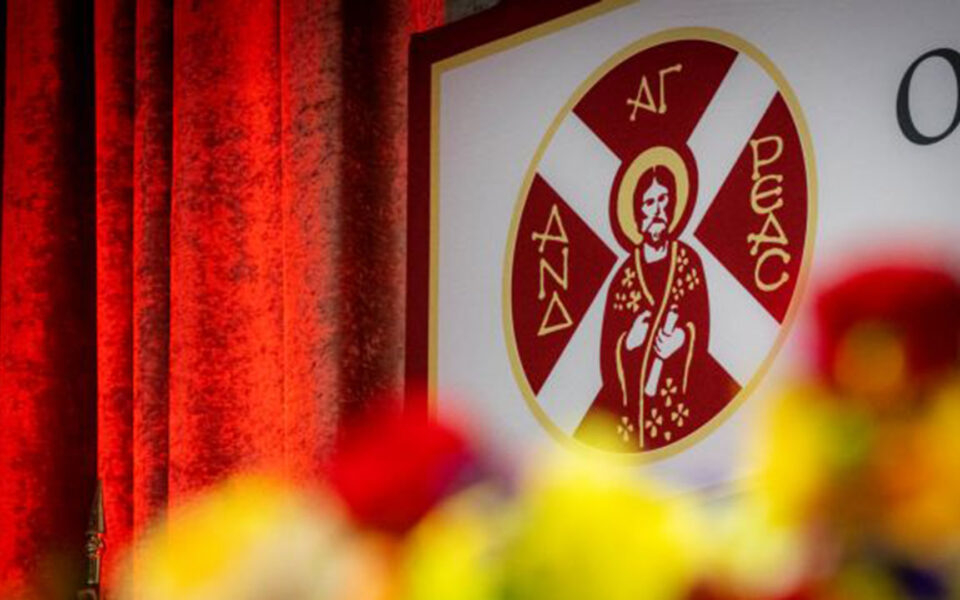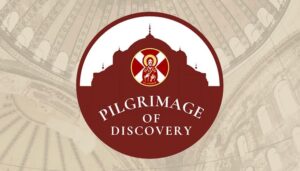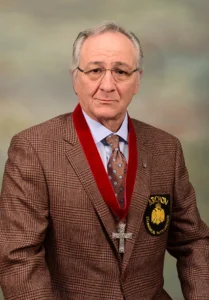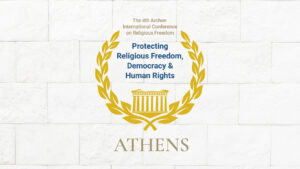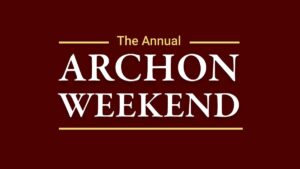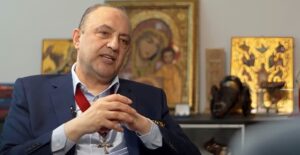The Archons of the Order of Saint Andrew were founded in 1966; however, the title of archon dates from antiquity and Medon of Athens.

Below, is an article prepared by Dr. Anthony J. Limberakis and Athanasios Martinos that appeared in Kathimerini English Edition – a daily newspaper published in Athens and distributed with the International New York Times in Greece and Cyprus.
Archons from all over the world, including Europe, North and South America, Asia and Australia, are converging upon Athens for the 4th International Archon Conference, “Protecting Religious Freedom, Democracy and Human Rights” (May 26-28). Co-sponsored by the Archons of Greece and Europe and the Archons in America, this conference will be followed by the first Global Summit of Archons (May 29), also in Athens. This has led many in Athens and elsewhere to wonder exactly what kind of conference is in the offing, and who the archons really are.
Today, the Archons of the Ecumenical Patriarchate are a devoted group of passionate leaders, relentlessly focused on protecting religious freedom for all and ensuring the future of the Ecumenical Patriarchate – the historical spiritual center of the world’s 300+ million Orthodox Christians.
The archons also have one of the longest and most illustrious histories of any organization in human history. In the United States, the Roman Catholic Knights of Columbus organization was founded in 1882, and the Anglican Brotherhood of St Andrew in 1883, but the title of archon is significantly older than both, and older than any other comparable group or organization. While the Archons of the Order of Saint Andrew was founded in 1966, the ancient order of archons is the oldest and most prestigious honor that can be bestowed upon a layman in the entire Christian world.
The title of archon, in fact, has been conferred upon notable, distinguished, and accomplished men since 11 centuries before the time of Christ. To bear the title of archon is to be part of a fraternity that includes statesmen of ancient Greece such as Medon of Athens, the first to bear the title of archon in the 11th century BC, Solon (6th century BC), Pericles, Themistocles, and Aristides the Just (5th century BC). Other renowned archons include Constantine the Great, the first Christian Roman emperor. Theodosios Staurakios, the governor of Cyprus who corresponded with Saint Photios the Great in the 9th century, was an archon. So was the 10th century Emperor Romanos I Lekapenos, and key members of the renowned Phokas military family that flourished in the 9th and 10th centuries.
Other notable archons throughout the ages include the diplomat and historian of the late period of the empire in Constantinople, Georgios Sphrantzes. So, too, was the great statesman and last grand duke of the Empire, Loukas Notaras. In the 20th century, the celebrated Greek film pioneer Spyros Skouras was an archon. The beloved Greek tenor Nikos Gounaris was honored with the title of archon. In a similar way, former US president Jimmy Carter and former Soviet leader Mikhail Gorbachev were conferred with the title of archon when they were awarded the Athenagoras Human Rights Award in 1987 and 2005, respectively. In our own day, the billionaire philanthropist and sports team owner Alex Spanos was also an archon.
Archon (ἄρχων, plural ἄρχοντες) means ruler or lord. In ancient Greece, as well throughout the life of the Roman Empire in its Byzantine period, it was frequently used as the title of a specific public office. It has been in use as a title for men of honor, distinction and public responsibility for virtually as long as there has been recorded history.
In ancient Athens, beginning in the 11th century BC, the city was ruled by a council of nine archons, three of whom oversaw political, military and religious affairs, while the other six comprised the judiciary.
Over time, civil magistrates in ancient Greece were generally known as άρχοντες, and this title continued to be used after the Roman Empire conquered Greece and Anatolia in the third and second centuries BC.
When the empire became Christian, the title continued to be used. In the Christian empire, the word was often used as a synonym for dynatoi (δυνατοί), a word used for high military and government officials, as well as metropolitans, bishops and hegoumenoi. Office holders were not just secular officials, but important leaders of the Christian community. As archons, they took on specific religious responsibilities for the service and promotion of the Holy Orthodox Faith in the Roman Empire.
By the 8th and 9th centuries AD, the governors of several Byzantine provinces, including Dalmatia, Cephalonia, Crete and Cyprus, were known as archons. Archons also were given other positions of civic responsibility, including charge of government installations such as naval bases, the mint and arsenals.
By the 10th century, Saint Symeon the New Theologian explained that archons were people who had both power and honor, and included them among those who were able to converse with the emperor personally on a regular basis. The governors of some cities and mayors of some towns were referred to on occasion as archons. Also, some generals (στρατηγοί) had aides who were known as archons. In the Christian Roman Empire, this meant that they were also men of singular piety and commitment to the Church.
In the middle of the 13th century, the title of archon was established as a special rank in imperial Constantinople, held by the highest-ranking official among the members of the Christian emperor’s court.
When the Ottomans conquered Constantinople in 1453, the political and military archons were swept away along with the other accoutrements of Byzantine rule. The title of archon continued to be bestowed, however, within the Church. A sign of how unique this distinction was, and still remains, is the fact that only the ecumenical patriarch has the solemn right and responsibility to confer the honor of the title of archon upon anyone.
Today, His All-Holiness Ecumenical Patriarch Bartholomew confers this noble and venerable title upon laymen who have performed outstanding service to God’s Holy Church, and whose labors in the world brought honor to the Hellenic community. Archons historically were honored because of their love, loyalty and support of the Ecumenical Patriarchate and their contribution to its advancement and welfare, just as the archons of today are likewise honored. They understand that this honor is not simply a recognition of past accomplishments, but a solemn responsibility before God to serve His Holy Church and protect and defend our Holy Mother Church of Constantinople.
The Archons of the Ecumenical Patriarchate meet annually as part of their efforts to advance religious freedom and the global salvific mission of the Sacred See of Saint Andrew. They celebrate their patronal feast on November 30, the feast day of Saint Andrew the Apostle. The fundamental goal of the archons is what it has been since the days of Classical Athens: to preserve peace, advance human dignity, foster civic responsibility, and ensure the integrity and future of faith. That is the purpose of the conference in Athens, and of all archon efforts.
Archon Dr Anthony J. Limberakis is national commander of the archons of the Ecumenical Patriarchate in America and Archon Athanasios Martinos is president of the Pammakaristos Brotherhood of Archons in Europe.
